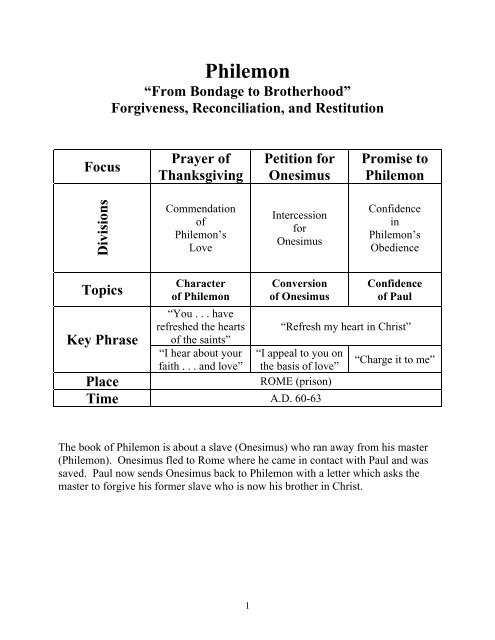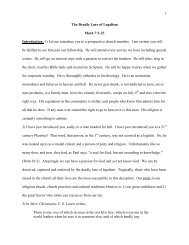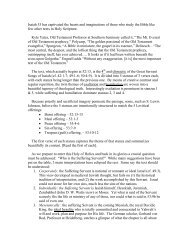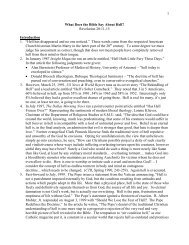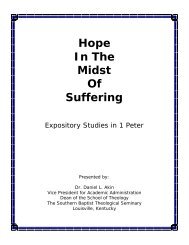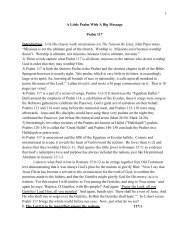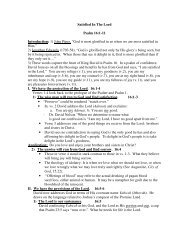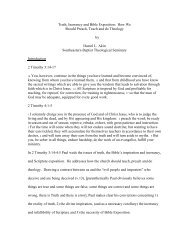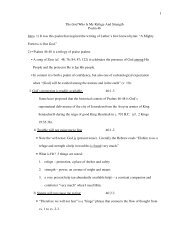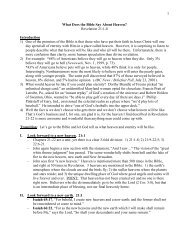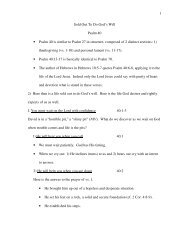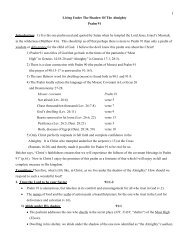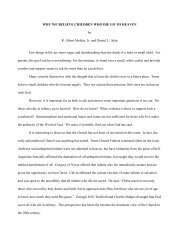Philemon - Daniel Akin
Philemon - Daniel Akin
Philemon - Daniel Akin
Create successful ePaper yourself
Turn your PDF publications into a flip-book with our unique Google optimized e-Paper software.
<strong>Philemon</strong>“From Bondage to Brotherhood”Forgiveness, Reconciliation, and RestitutionFocusPrayer ofThanksgivingPetition forOnesimusPromise to<strong>Philemon</strong>DivisionsCommendationof<strong>Philemon</strong>’sLoveIntercessionforOnesimusConfidencein<strong>Philemon</strong>’sObedienceTopicsKey PhrasePlaceCharacterof <strong>Philemon</strong>“You . . . haverefreshed the heartsof the saints”“I hear about yourfaith . . . and love”Conversionof OnesimusConfidenceof Paul“Refresh my heart in Christ”“I appeal to you onthe basis of love”ROME (prison)Time A.D. 60-63“Charge it to me”The book of <strong>Philemon</strong> is about a slave (Onesimus) who ran away from his master(<strong>Philemon</strong>). Onesimus fled to Rome where he came in contact with Paul and wassaved. Paul now sends Onesimus back to <strong>Philemon</strong> with a letter which asks themaster to forgive his former slave who is now his brother in Christ.1
Introduction to <strong>Philemon</strong>This brief 25-verse letter is unique in the writings of Paul. Thoughaddressed to <strong>Philemon</strong> of Colosse, it is not, strictly speaking, a private letter as itscontent reveals. Yet it is occasioned by a personal problem that the Apostle hopesto resolve. The letter provides an interesting glimpse into the Apostle Paul’sstrategy in handling personal issues as they impact the lives of his converts.<strong>Philemon</strong> is one of the five one-chapter books of the Bible, the other four beingObadiah, 2 and 3 John, and Jude.I. AuthorshipPaul is the author of this letter (v. 1). Only the most radical and skepticalscholars have questioned its genuineness. Such critics are usuallymotivated by the fact that the book strongly supports the authenticity ofColossians, which they question or reject. The book, however, wasunanimously affirmed by the early church. In spite of its brevity, theauthenticity (that it is Pauline) and canonicity (that it belonged in ourN.T. as an inspire writing) of it was never seriously questioned. Style,vocabulary, and other internal considerations are consistent with what weknow of Paul.II.Date and Location of Writing<strong>Philemon</strong> is a prison epistle and its date and location of writing is tied tothis issue. The traditional view is that the epistle was written from Romebetween A.D. 60-63, and the imprisonment is that of Paul’s first Romanincarceration as recorded in Acts 28:30-31. Altogether Paul penned fourepistles during his first Roman imprisonment—Ephesians, Philippians,Colossians, and <strong>Philemon</strong>. Ephesians and Colossians are sometimescalled twin epistles because of their similar content. Colossians and<strong>Philemon</strong> are often called sister epistles because of their commonrecipient and destination.An alternate theory is that the epistle of <strong>Philemon</strong> was written either fromCaesarea or Ephesus in the mid-50s. The Ephesian hypothesis hasespecially been attractive to some recent scholars because of its nearerproximity and therefore more convenient location to Colosse (about 1002
miles). This theory also makes the return trip by Onesimus and Tychicusto Colosse easier, as well as Paul’s intended forthcoming visit (v. 22). Itis further argued that this scenario clears up two previously obscureappeals the Apostle made in Col. 4:16-17. Paul requested there thatColossians be read by the church at Laodicea, and of the church atColosse he asked that “you likewise read the epistle from Laodicea” (v.16). If this theory is correct, <strong>Philemon</strong> is the “lost” letter to theLaodiceans. Then Paul told the church at Colosse to remind Archippusto fulfill the service he received from the Lord (Col. 4:17), i.e., thefreeing of Onesimus. Through both appeals Paul invited the church tointercede with the slave master to release Onesimus and return him toPaul’s service.Though an attractive alternative, this latter theory is not sufficientlystrong to overturn the virtually unanimous testimony of the early church.In addition, though the Roman hypothesis makes correspondence andtravel more difficult, it does not make it impossible. It is alsoquestionable whether the Ephesian imprisonment allowed enough timefor correspondence. When all things are considered, a date of A.D. 60-63from Rome is still the most likely scenario.III.Occasion of the EpistleThis letter is a semi-private and personal appeal by Paul to <strong>Philemon</strong>asking him to unconditionally forgive and receive back his slaveOnesimus without penalty (v. 17). Before he was a slave, but now he is abeloved brother (v. 16). Paul will personally be responsible for any debtsOnesimus has incurred (v. 18). We do not know why Onesimus ranaway or if he took anything from his master. All we know is theconversion of Onesimus and Paul’s appeal. Since a slave was subject tosevere discipline for running away, even death, Paul’s appeal is a kindand gracious act on behalf of Onesimus.This epistle is also an insightful guide as to how believers might go aboutthe task of mediating conflicts within the family of God. As aninstruction manual in resolving personal difficulties between Christians,this short epistle is of great value. Tychicus probably accompaniedOnesimus back to <strong>Philemon</strong> as he returned from Paul with the letter ofColossians (cf. Col. 4:7-9).3
meant the death-knell of that institution. That anyone claiming the nameof Jesus Christ could advocate slavery is simply another indictment ofour depravity and wickedness.VI.Structure and Key Verse<strong>Philemon</strong> is a marvelous example of the use of “mitigatedexhortation.” Indeed, as a type of hortatory (exhortation) discourse, itcontains the three salient components of: (1) problem, (2) command, and(3) motivation. However, Paul mitigates the command to the finalposition of the text. This is borne out by the fact that there is not a singleimperative in vv. 1-16, but in verses 17-20 there are three imperativesthat rapidly follow one another (a fourth is in v. 22). Verse 17, therefore,is the key to the book where Paul says to <strong>Philemon</strong>, “Receive him(Onesimus) as you would receive me.” Paul employs psychological tact,while at the same time not sacrificing his apostle’s authority.VII. Points of Interest Concerning <strong>Philemon</strong>1. Paul’s shortest epistle (25 verses)2. Only 335 words in the Greek text3. Most private of all of Paul’s epistles4. Presents a beautiful picture of the gospel by way of analogy:i. All of us were once like Onesimus, runaways (sinners) from ourrightful owner (God).ii. Someone on our behalf has pleaded our case, even to the payingof our debt (Jesus Christ) 1 Tim. 2:5iii. Through our advocate we can be restored, even to the adoptionof sons!VIII. Exegetical Insights in <strong>Philemon</strong>1. Key Words and Their OccurrenceA. Lord (6 times: vs. 3, 5, 16, 20, 20, 25)B. Jesus (5 times: vs. 1, 3, 5, 6, 25)C. Christ (7 times: vs. 1, 3, 6, 8, 9, 23, 25)D. Love (agape in some form; 5 times: vs. 1, 5, 7, 9, 16)E. Heart (bowels, innermost being; 3 times: vs. 7, 12, 20)5
F. Prisoner (sometimes translated “chains;” 5 times: vs. 1, 9,10, 13; also “fellow prisoner” in vs. 23, but there itis a different Greek word.)• In Greek there are three (possibly four) key words for love:(1) Eros—from which we derive our word “erotic.” Itspeaks of sensual, physical desire for something.(2) Phileo—which speaks of brotherly (or friendship) loveone for another.(3) Agape—a word uniquely developed in the N.T. Itspeaks of a sacrificial giving for the ultimate good ofanother. This love is not emotional or sensual; it isvolitional.(4) Storge—familial or family love.It has been said by one that:Eros is the take kind of love.Phileo is the give and take kind of love.Agape is the give kind of love.2. A Key IdeaThe house church—There is no evidence for church buildings ofany magnitude until the third century. Interestingly, withoutelaborate buildings, budgets, or programs, the early church tookthe gospel message literally across the world with tremendoussuccess via the hand of God. There are numerous references in theN.T. to house churches and their hosts:Gaius at Rome (Rom. 16:23)Nymnpha at Laodicea (Col. 4:15)Aquila and Priscilla at Ephesus (1 Cor. 16:19)Aquila and Priscilla at Rome (Rom. 16:3, 5)Lydia at Philippi (Acts 16:15, 40)<strong>Philemon</strong> at Colosse (<strong>Philemon</strong> 2)Mary at Jerusalem (Acts 12:12)Jason at Thessalonica (Acts 17:5-6)6
<strong>Philemon</strong>Paul’s Greeting to <strong>Philemon</strong> vv. 1-3Paul’s Thanksgiving and Prayer vv. 4-7Paul is always thankfulv. 4aWhen is Paul thankful v. 4b When he mentions them in prayerReason for thanksgiving v. 5 Because he heard of their:1) faith in Christ2) love for the saintsContent of the prayer v. 6 For an effective sharing from faith inthe context of a full knowledge ofGod’s will for us in ChristReason for Paul’s joy v. 7 Because of <strong>Philemon</strong>’s love thatand comfortrefreshed the saintsPaul’s Approach to the Request vv. 8-12A possible basis of the request v. 8 Paul could request the properresponse on the ground of hisauthority (i.e., as an apostle)The proper basis of Paul’s v. 9a For love’s sake he appeals; he doesrequestnot commandThe humble condition of v. 9b An aged man who is now a prisonerthe one who requestsThe subject of the request v. 10-12 Onesimus1) Paul’s son2) Converted while Paul was inchains3) Formerly useless, but nowuseful to Paul and <strong>Philemon</strong>4) The one sent to <strong>Philemon</strong> isto be received as if he werePaul7
The Context of the Request vv. 13-14Paul’s original desire v. 13 To keep Onesimus as <strong>Philemon</strong>’sminister to himWhy Paul refused his desire v. 14a He did not wish to act without<strong>Philemon</strong>’s consentThe reason Paul wanted v. 14b So that <strong>Philemon</strong> would act<strong>Philemon</strong>’s inputvoluntarilyPaul’s View of the Situation vv. 15-16Paul’s explanation of the v. 15 That <strong>Philemon</strong> might receive backseparation and why hein full Onesimus for eternitycannot keep OnesimusPaul’s view of Onesimus v. 16 Regard him as a brother, not as athat <strong>Philemon</strong> should shareslave; As he had been to Paul, mayhe be so much more to <strong>Philemon</strong>.Paul’s Request vv. 17-20Paul’s request v. 17 Receive Onesimus as you would me.Paul’s offer v. 18-19a Any obligation should be credited toPaul. He will pay it back.Reminder about the offer v. 19b Paul could remind <strong>Philemon</strong> he owesof PaulPaul his life (spiritual).Paul’s request for himself v. 20 Give Paul this benefit and refresh hisaffection in Christ.Paul’s Confidence vv. 21-22Paul’s knowledge v. 21 Paul writes knowing <strong>Philemon</strong> willdo what Paul requests.Paul’s hope v. 22 <strong>Philemon</strong> is to prepare a guest room,for Paul hopes to visit him becauseof answered prayer.Paul’s Final Greetings and vv. 23-25Benediction8
“The Grace of Gentle Arm-Twisting”A Marvelous Model of Tact(<strong>Philemon</strong> 17-25)I. UChoose the right wordsU vv. 17-201. Receive Love him as you love me (substitution), v. 172. Reckon If a wrong needs to be corrected, lay it to myaccount (satisfaction), vv. 18-193. Refresh Do what you should for Christ’s sake(reconciliation), vs. 20. Note the 3 imperatives invv. 17, 18, 20 and the way in which Paul softenstheir sting.II. UCommunicate with reaffirming wisdomU vv. 21-221. Express your confidence as to their action, v. 212. Express your confidence as to your reception, v. 22(A fourth imperative is in v. 22. It also is conveyed in a gentle andgracious manner.III. UCovenant with respected witnessesU vv. 22-251. There should be earthly confirmation, vv. 23-242. There should be heavenly confirmation, v. 25• Remember: “Friends are not good unless you can use them.”(Jim Parker)• Also Remember: “When you use a friend, use him good.”9
Concluding ObservationsThe book of <strong>Philemon</strong> is one that emphasizes the dual track ofaccountability and sensitivity. It is indeed a “model of tact.”Proverbs tell us that the wise man will make a good choice of the words heuses when he speaks. The right word at the right time to the right person is aneffective and beautiful thing. Note the following verses:Prov. 10:32—“The lips of the righteous know what is fitting, but the mouthof the wicked only what is perverse.”Prov. 12:18—“Reckless words pierce like a sword, but the tongue of thewise brings healing.”Prov. 15:1—“A gentle answer turns away wrath, but a harsh word stirs upanger.”Prov. 15:23—“A man finds joy in giving an apt reply—and how good is atimely word!”Prov. 15:28—“The heart of the righteous pondes how to answer, but themouth of the wicked pours out evil things.”Prov. 16:24—“Pleasant words are a honeycomb, sweet to the soul andhealing to the bones.”Prov. 25:11—“A word aptly spoken is like apples of gold in settings ofsilver.”Prov. 26:4-5—“Do not answer a fool according to his folly, or you will belike him yourself. Answer a fool according to his folly, or he will be wise inhis own eyes.”Again, the right word at the right time to the right person is a wonderfulthing, a beautiful thing, a sweet thing, a pleasant thing, even a joyful thing.However, this doesn’t mean that the facts are not considered. Tact is honest.It involves no sacrifice of honesty or candor. The tactful person does not shirk hisduty even when he is convinced that he must admonish or rebuke. But he haslearned the art of doing this without being rude. Paul told the truth about10
Onesimus and set forth an honest case. He admitted that the runaway slave hadbeen useless. But Paul notes that there had been a radical change in the man. Hewas honest, but he was kind. He was tactful. He leaves us a marvelous pattern tofollow. Therefore, may all remember the following:A careless word may kindle strife;A cruel word may wreck a life;A bitter word may smite and kill;A brutal word will accomplish nil;A gracious word may smooth the way;A joyous word may light the way;A timely word may lessen stress;A loving word may heal and bless.11


